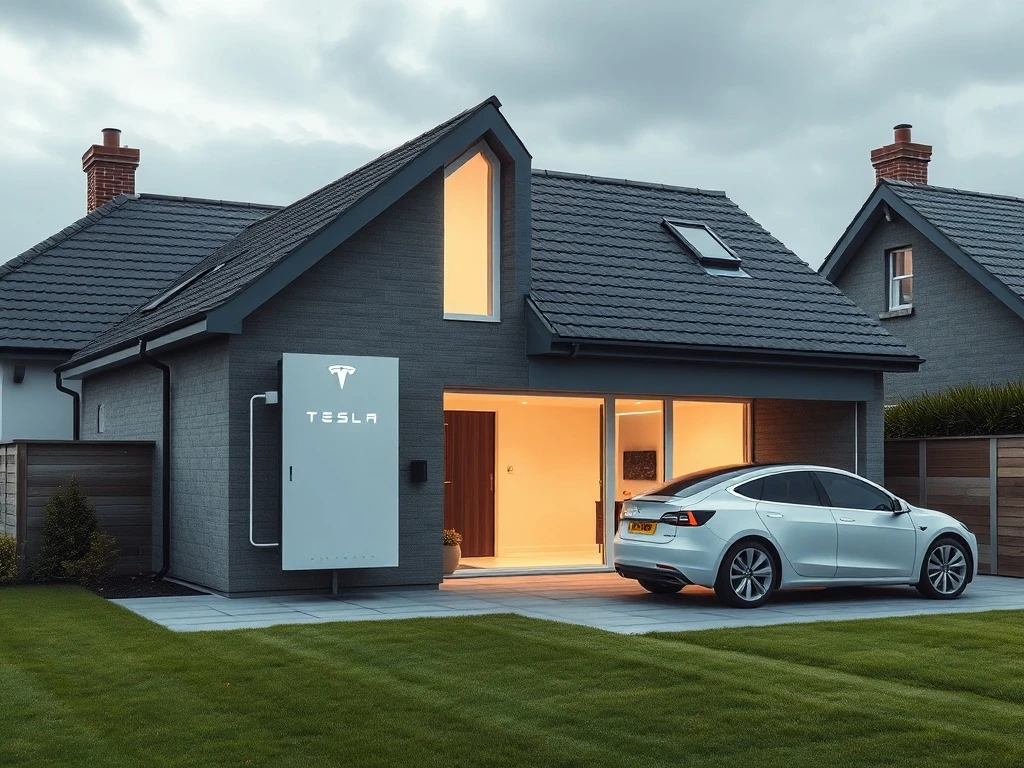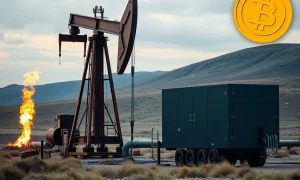A monumental shift is underway in the British energy sector. Elon Musk’s innovative company, Tesla, is poised to redefine how homes power themselves. The electric vehicle giant has formally applied for a licence to supply Tesla electricity UK homes and businesses. This bold move signals a significant expansion of Tesla’s energy ambitions. It promises to integrate renewable energy solutions more deeply into daily life across Great Britain.
Tesla Electricity UK: The Groundbreaking Application
Tesla Energy Ventures, the company’s Manchester-based energy arm, lodged a formal application with Ofgem last month. Ofgem is the UK’s energy regulator. Andrew Payne, Tesla’s head of European energy operations, signed the application. This crucial step seeks an electricity supply licence covering England, Scotland, and Wales. If approved, Tesla could begin offering domestic electricity deals as early as next year. These services might operate under the brand ‘Tesla Electric’.
The regulatory assessment period can extend up to nine months. Therefore, consumers will likely await official approval before experiencing Tesla electricity UK services. This application builds on Tesla’s existing UK presence. The company secured a licence to operate as an electricity generator in 2020. Consequently, this new application represents a natural progression towards full vertical integration in the energy sector.
Strategic Vision: Integrating Tesla Electricity UK into the Ecosystem
Tesla aims to target its existing customer base. This includes owners of its products, like Tesla Powerwall home storage batteries and electric vehicles. The company envisions offering attractive incentives. For instance, customers could receive cheaper charging rates for their EVs. They might also earn payments for selling surplus solar energy back to the national grid. This approach leverages Tesla’s unique ecosystem of products.
However, the current licence application covers only electricity supply. Households on dual-fuel gas and electricity contracts would need to use separate suppliers for their gas needs. This limitation means a full switch to Tesla electricity UK would require managing two different providers for some customers. Nevertheless, the strategic advantage lies in integrating energy generation, storage, and consumption. This creates a seamless energy experience for Tesla users.
Leveraging Powerwall and EV Charging
Tesla has already sold significant numbers of Powerwall systems in Britain. These home batteries allow households to store energy efficiently. Users can store energy from solar panels or the grid during off-peak hours. This capability provides greater energy independence and resilience. Furthermore, Tesla offers home charging units for its cars. These units form a natural customer base for its potential electricity supply business. Imagine a future where your car and home are powered by a single, integrated energy provider.
This integration offers several benefits:
- Optimized Energy Use: Powerwall users can maximize self-consumption of solar energy.
- Cost Savings: Cheaper charging rates for Tesla EVs can reduce transport costs.
- Grid Support: Selling excess energy back to the grid can provide revenue and support grid stability.
- Simplified Management: A single app could manage home energy, vehicle charging, and utility bills.
Such a comprehensive offering could appeal strongly to environmentally conscious consumers. It also targets those seeking to reduce their energy bills. The vision for Tesla electricity UK extends beyond mere supply. It aims to create a holistic energy management system.
Benefits for UK Consumers and the Grid
Tesla’s entry into the UK energy retail market could bring significant advantages. Firstly, it introduces a new, technologically advanced competitor. This increased competition could drive down prices across the sector. Consumers might benefit from more innovative tariffs and better service. Secondly, Tesla’s focus on integrated solutions could accelerate the adoption of renewable energy technologies. Powerwall installations, for example, might increase. This supports the UK’s net-zero targets.
Moreover, a more dynamic energy market benefits the national grid. Distributed energy resources, like Powerwall batteries, can provide flexibility. They can store excess renewable energy during periods of high generation. They can then release it during peak demand. This helps balance the grid and reduces reliance on fossil fuel power plants. Therefore, Tesla electricity UK could contribute to a more stable and sustainable energy infrastructure.
Driving Innovation and Sustainability
The UK energy market is undergoing a transformation. The push towards decarbonization is strong. Tesla’s expertise in battery technology and energy management aligns perfectly with these goals. Their potential offerings could incentivize more homes to adopt solar panels. They could also encourage the use of smart energy management systems. This fosters a more sustainable energy ecosystem.
For example, in Texas, Tesla launched its first household supply offer in 2022. Customers there access low-cost charging. They also sell excess stored or generated energy back to the grid. This model demonstrates a viable pathway for Tesla electricity UK operations. The success in Texas provides a blueprint. It shows how Tesla can integrate its products with retail energy supply effectively.
Navigating the UK Energy Market Landscape
The UK energy market is highly regulated. It also features established players. Tesla will face competition from incumbent suppliers. It will also need to navigate complex regulatory frameworks. Ofgem’s assessment process is rigorous. It ensures new entrants meet strict financial and operational standards. Compliance with these regulations is paramount for a successful launch.
Furthermore, consumer trust is vital. Building a reputation as a reliable energy supplier takes time. Tesla’s brand recognition is strong. However, its performance in the energy retail sector will be closely scrutinized. The company must demonstrate robust customer service and competitive pricing. This will be key to attracting and retaining customers beyond its existing product owners.
Potential Challenges and Opportunities for Tesla Electricity UK
Despite the immense potential, challenges exist. The energy market is sensitive to global price fluctuations. Geopolitical events can impact energy costs significantly. Tesla must develop a resilient business model. It needs to absorb these shocks while maintaining competitive tariffs. Additionally, scaling up operations to serve a national customer base requires substantial investment in infrastructure and personnel.
However, the opportunities are vast. The UK is committed to transitioning to clean energy. This creates a fertile ground for innovative solutions. Tesla’s integrated approach could differentiate it from traditional suppliers. By offering a complete energy solution, from generation to consumption, Tesla positions itself uniquely. This could make Tesla electricity UK a dominant force in the green energy transition.
Addressing Recent Headwinds and Future Outlook
The UK launch comes amid some challenges for Tesla. The company has seen a slowdown in its European car sales. July figures from the Society of Motor Manufacturers and Traders (SMMT) show a significant drop. UK registrations fell almost 60% year-on-year to 987 vehicles. This reduced Tesla’s market share to 0.7%. For 2025 so far, UK sales are down 7%. These figures highlight the need for diversified revenue streams.
Elon Musk has also faced recent political controversy. This includes a strained relationship with Donald Trump. He also drew criticism over his interventions in politics in Germany, France, and the UK. While these issues are separate from the energy business, they can influence public perception. Tesla’s energy division, however, operates with a distinct focus on technological innovation and market expansion.
Tesla’s Long-Term Energy Strategy
Moving into household energy supply aligns with Tesla’s broader mission. The company aims to accelerate the world’s transition to sustainable energy. This involves more than just electric vehicles. It encompasses solar generation, battery storage, and now, retail electricity supply. This vertical integration strategy is a core component of Tesla’s long-term vision. It positions the company as a comprehensive clean energy provider.
The potential success of Tesla electricity UK could serve as a model for other markets. As countries worldwide push for decarbonization, integrated energy solutions will become increasingly vital. Tesla’s bold step in the UK could pave the way for a more sustainable and efficient energy future globally. This strategic move reinforces Tesla’s commitment to transforming the energy landscape, one home at a time.
Conclusion
Tesla’s application to supply electricity to British homes marks a pivotal moment. It signifies a major expansion of the company’s energy ambitions in the UK. If approved, this move will allow Tesla to leverage its Powerwall batteries and EV charging infrastructure. It will offer an integrated, clean energy solution to consumers. Despite some recent challenges in car sales and public perception, Tesla’s long-term vision for vertical integration in the clean energy sector remains clear. The future of Tesla electricity UK looks set to be innovative, competitive, and transformative for the British energy market.
Frequently Asked Questions (FAQs)
Q1: What is Tesla’s recent application about in the UK?
Tesla has applied to Ofgem, the UK energy regulator, for a licence to supply electricity directly to homes and businesses across Great Britain. This move would allow them to become a retail electricity provider in the UK.
Q2: When could Tesla start supplying electricity in the UK?
Ofgem can take up to nine months to assess supply applications. If approved, Tesla could potentially begin offering domestic electricity deals as early as next year, possibly under the ‘Tesla Electric’ brand.
Q3: Which customers will Tesla target with its electricity supply?
Tesla is expected to primarily target customers who already own its products, such as Tesla Powerwall home storage batteries or its electric vehicles. This strategy aims to offer integrated benefits like cheaper charging and payments for selling surplus solar energy back to the grid.
Q4: Will Tesla offer dual-fuel (gas and electricity) contracts?
No, the current licence application covers only electricity. This means households on dual-fuel contracts would need to split suppliers, using Tesla for electricity and another provider for gas.
Q5: How does this move align with Tesla’s broader strategy?
This move positions Tesla as a vertically integrated player in the clean energy sector. It extends their reach from solar generation and battery storage to electric vehicle charging and now retail electricity supply, aligning with their mission to accelerate the world’s transition to sustainable energy.
Q6: What potential benefits could Tesla’s entry bring to the UK energy market?
Tesla’s entry could increase competition, potentially leading to more innovative tariffs and better service for consumers. It could also accelerate the adoption of renewable energy technologies and contribute to greater grid stability through distributed energy resources like Powerwall batteries.
























